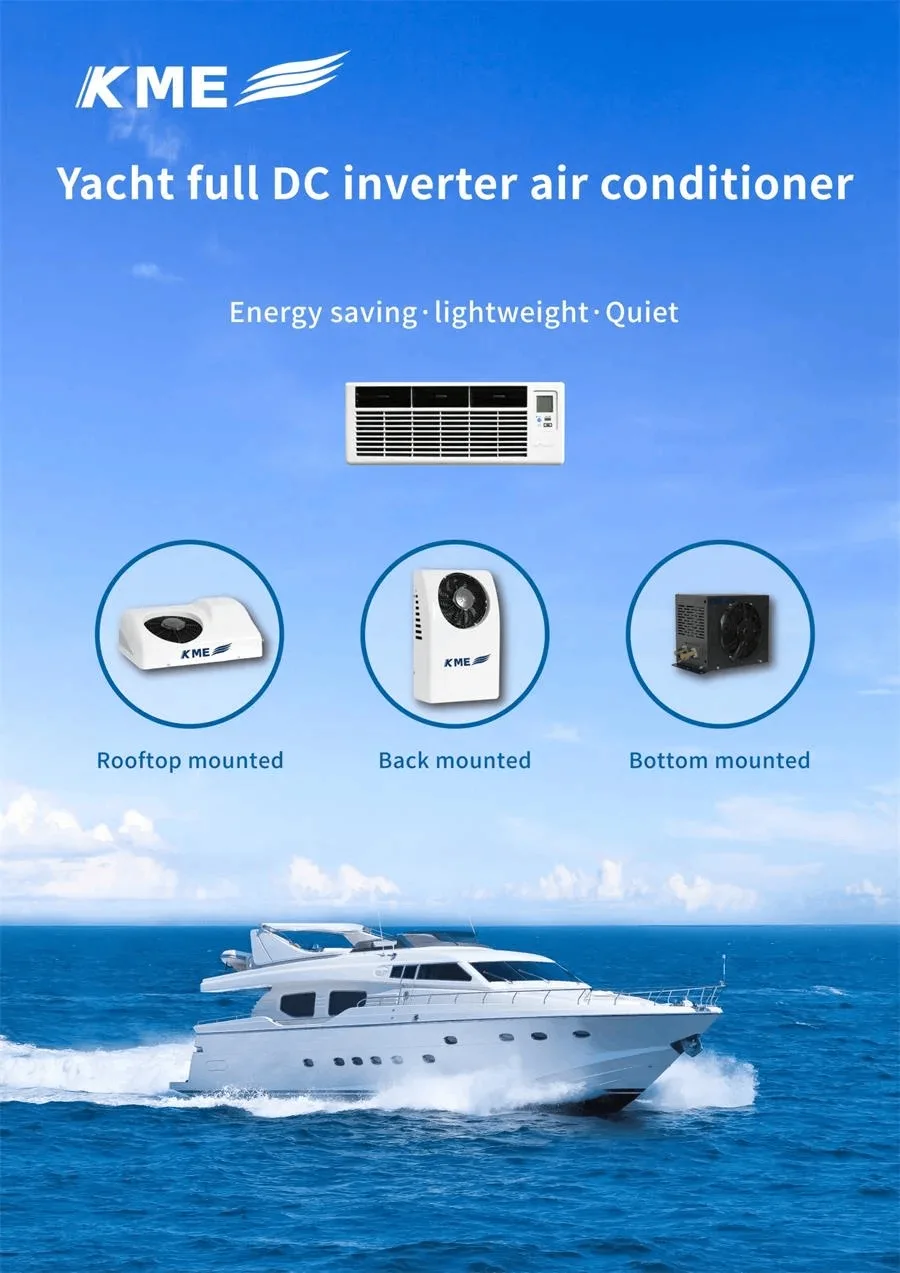Driving a yacht out to sea in the hot summer, while enjoying the sea breeze and sunshine, the comfort in the cabin is also very important. Especially in a high temperature and high humidity environment, an efficient and stable yacht air conditioner can not only improve the riding experience, but also ensure the health and safety of electrical equipment and passengers. However, many ship owners will encounter a key problem when purchasing yacht air conditioners: How much power do I need for a yacht air conditioner? If the power is too small, it cannot cool down quickly; if the power is too large, it may cause energy waste and frequent start and stop, affecting the life of the equipment.
This article will systematically sort out the various factors for selecting the power of yacht air conditioners for you, helping you to accurately judge the cooling capacity and power output of the required air conditioner, so that you can feel cool and comfortable every time you sail.
1. What is the "power" of yacht air conditioners?
When choosing yacht air conditioners, we often hear terms such as "cooling capacity", "cooling capacity" and "power". Here we need to clarify a basic concept first: the power of air conditioners in actual applications refers to its cooling capacity, usually in BTU (British thermal units) or kW (kilowatts). 1kW is approximately equal to 3412BTU. Simply put, the larger the value, the more heat the air conditioner can take away per unit time, and the more "powerful" it is.
For yacht air conditioners, the choice of cooling capacity is more complicated than that of household air conditioners, because the internal space structure of the ship is changeable and the heat source is more complex (such as engine heat radiation, sunlight, sea surface reflection, etc.), and the air conditioner must have stronger environmental adaptability and stability.
2. The main factors affecting the selection of yacht air conditioner power
To scientifically determine the power of the required air conditioner, you must start from the following key dimensions:
Ship length and internal space volume
Hull length is often the first reference factor for judging the cooling capacity of air conditioners. Generally speaking:
Small yachts (less than 30 feet): It is recommended to use 7000~10000 BTU air conditioners;
Medium-sized yachts (3050 feet): It is recommended to use 16000 BTU air conditioners;
Large yachts (over 50 feet): Usually multiple 18000~24000 BTU air conditioning systems are required to work in conjunction.
However, a more accurate calculation should be based on the "actual volume of the cabin", that is, the number of cubic meters of the internal length × width × height, and then multiplied by the heat load factor (generally 140~170BTU/cubic meter) to estimate the cooling capacity.

Number and layout of cabins
The cabin layout of the yacht will also affect the choice of air conditioning. For example, an integrated salon cabin is easier to cool than multiple independent cabins; closed bedrooms and cockpits are more likely to accumulate heat and require independent air conditioning modules. If there are many cabins, you should consider installing a multi-split air conditioning system or a central air conditioning system to ensure that each space can maintain a suitable temperature.
Sunlight and glass area
Although the glass skylights, portholes, and side windows on the yacht improve the lighting and viewing experience, they also increase the solar radiation load and significantly increase the temperature in the cabin. The larger the glass area and the stronger the sunlight, the higher the required air conditioning power. For areas with longer sunshine hours or ships with panoramic glass roofs, an additional 15%~30% of cooling capacity is required as safety redundancy.
Hull material and insulation performance
Yacht materials are usually fiberglass, aluminum alloy or composite materials. Different materials have different thermal conductivity. FRP has better thermal insulation, while metal materials have strong thermal conductivity and fast heat dissipation, so higher cooling capacity is required to maintain a comfortable temperature. In addition, whether the hull has been insulated and whether the bulkhead has insulation materials are also important references that affect power selection.
Number of people and equipment in the cabin
The heat dissipation of the human body and the electrical equipment used in the cabin (such as refrigerators, audio equipment, kitchen equipment, etc.) will generate heat, increasing the burden on the air conditioner.
Other auxiliary factors: power system and cooling method
While considering power matching, you must also ensure that your yacht power supply system can stably support the operation of the air conditioner. At present, most mainstream yacht air conditioners use 220V AC. The higher the power, the greater the demand for generators or shore power.
In addition, the condensation method of the air conditioner also affects the use effect:
The air cooling system has a simple structure, but its cooling capacity is limited in high temperature environments;
The water cooling system (seawater condensation) is suitable for long-term mooring or tropical navigation. The cooling effect is stable, but the seawater filter needs to be cleaned regularly.
Overall, the choice of yacht air conditioning power is not a digital game that can be achieved overnight, but a systematic engineering judgment. It involves multiple factors such as ship structure, use area, number of people, sunshine conditions and power supply environment. Choosing the right air conditioner will not only make your yacht comfortable like home, but also improve the quality and safety of life at sea.
If you are planning to buy an air conditioner for your yacht, please contact us, a professional yacht air conditioner supplier, to provide detailed ship type and navigation information and obtain customized solutions. The right air conditioner power is not only a guarantee of coolness, but also the starting point of quality sailing life. Want to learn more about the selection, installation and maintenance of yacht air conditioners? Welcome to follow us, we will continue to share professional maritime equipment application guides for you.
www.kmevehicleac.com
kmevehicleac